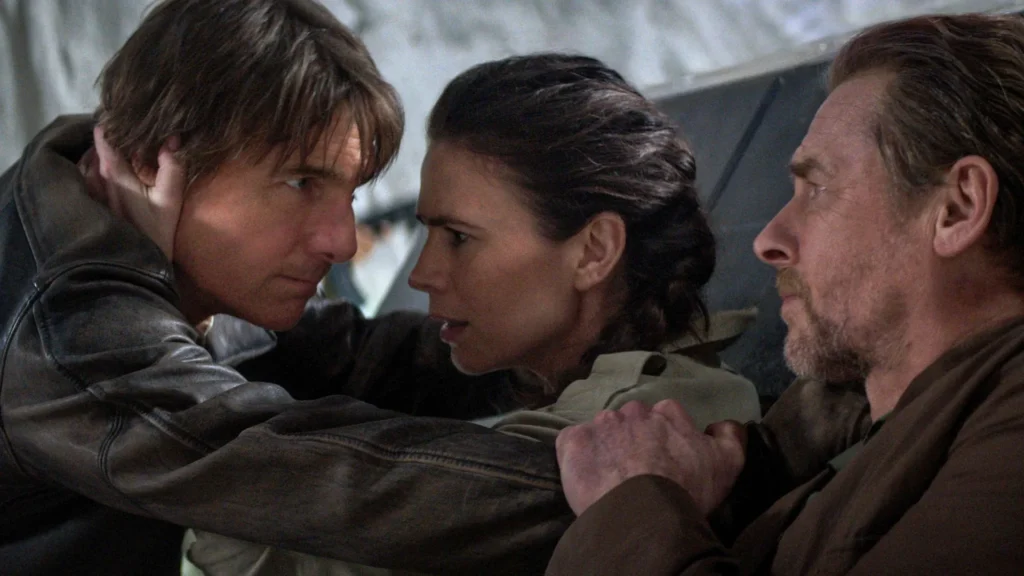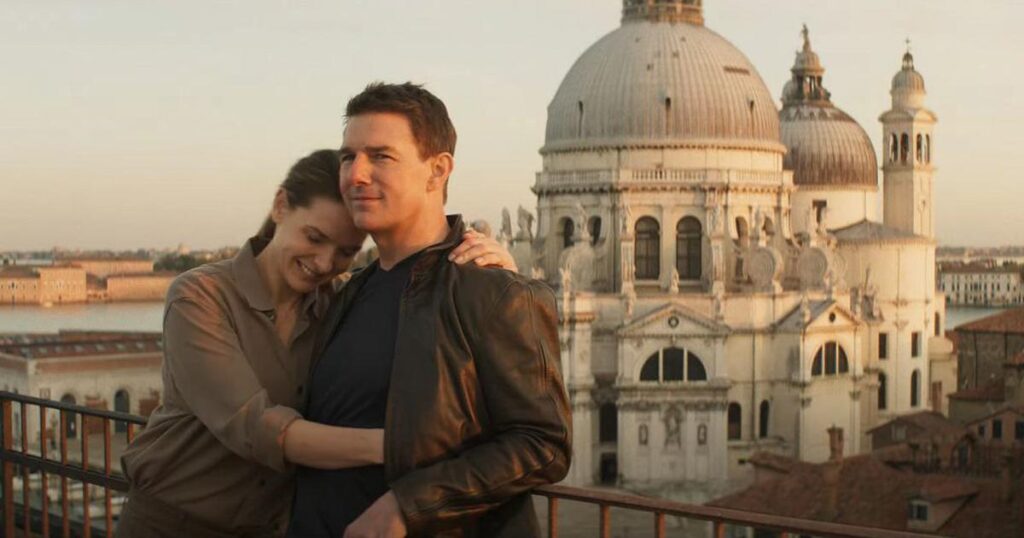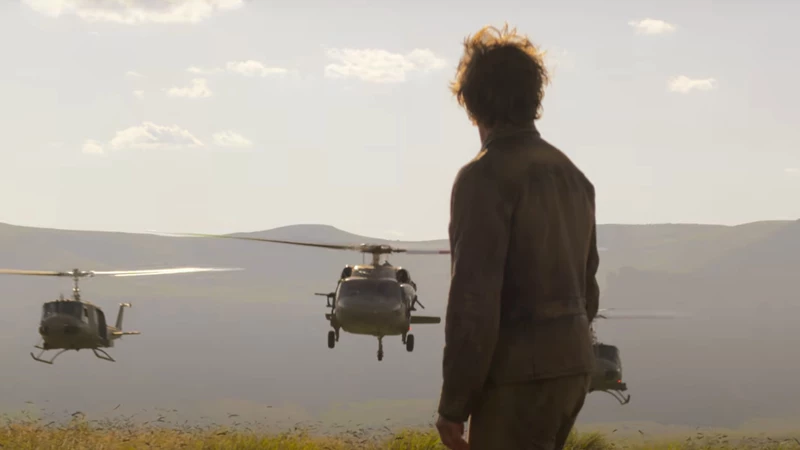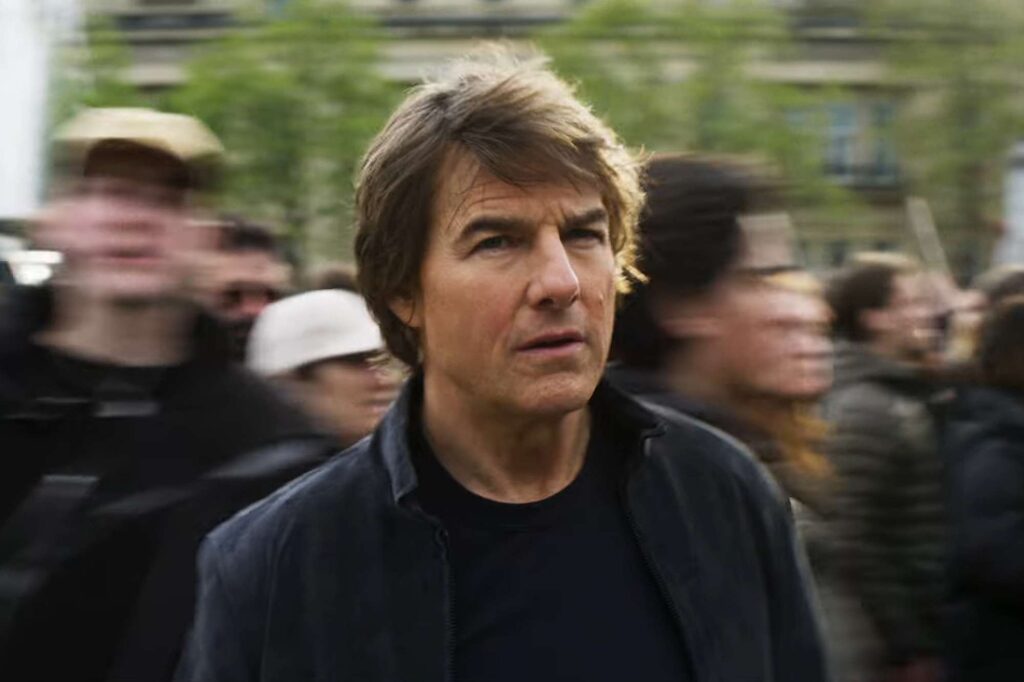From across Seattle’s Pier 47, Ethan Hunt (Tom Cruise) gazes at his ex-wife, Julia (Michelle Monaghan). They smile as their eyes meet. She raises her hand in farewell. He vanishes in a swirl of steam.
That wordless reconciliation concludes Brad Bird’s “Mission: Impossible – Ghost Protocol” (2011), but it wasn’t supposed to. In an earlier script, Julia was killed, a twist that uncredited rewriter Christopher McQuarrie couldn’t abide.
“Emotionally, if Julia’s dead, no matter how this story turns out, I’m sad,” McQuarrie later said in an interview with Light the Fuse. “A hundred means you’re at 90, because no matter how well Ethan wins, he’s carrying this failure that you’ve alluded to [throughout] the entire movie.”
In a franchise where women were forgotten at best and discarded at worst, McQuarrie’s empathy was disarming. Julia may have been a minor character, but her being happy and alive mattered to him, just as it did to Ethan.
“You’ve got to let the audience off the hook tonally in Brad Bird’s ‘Mission: Impossible,’” said McQuarrie, who would direct the next four “Mission” films. Like Bird, he would dare to be comforting and conventional, shaming the Nolan wannabes futilely chasing the next “Dark Knight.”
I wish that McQuarrie’s nerve to entertain never failed him; that “Mission: Impossible – The Final Reckoning,” which opens today, was an elegant end to his tenure as “Mission” specialist; and that the film was good enough to be a balm for our brutalized world.
I wish I could tell you those things because I don’t just love “Mission: Impossible.” I owe “Mission: Impossible,” which has often roused me in times of crisis—not only with the suavity of Cruise’s stunt work, but the companionship of Ethan’s spunky Impossible Mission Force (IMF) team.
Unfortunately, it is because I love the “Mission: Impossible” movies that I owe them the truth: “The Final Reckoning” is one of the bitterest and most baffling cinematic disappointments of my lifetime, so bloated by self-importance that it can barely breathe.
“Now you are the chosen one,” a disembodied voice instructs Ethan as the film gets going. It is an ominous premonition of pretensions to come, intimating that McQuarrie has all but forsaken Bird’s creed: “This is not brain surgery. We’re making popcorn. And I like it hot and fresh.”

The heat and freshness were still intact as recently as McQuarrie’s “Mission: Impossible – Dead Reckoning” (2023), which ended with Ethan on the run from the Entity—a virtual menace described as a “self-aware, self-learning, truth-eating digital parasite.”
“The world doesn’t know it, but they’re counting on you,” CIA Director Eugene Kittridge (Henry Czerny) informed Ethan. It was one of the more intoxicating cliffhangers in contemporary cinema, filling you not with irritation at an incomplete narrative, but exhilaration at the thought of thrills to come.
In “The Final Reckoning,” the Entity has inspired a “doomsday cult,” which has infiltrated governments worldwide. Only the United States, the United Kingdom, China, and Russia retain control of their nuclear arsenals, a prospect not nearly as comforting as the film seems to think it is.
“Madam President, we’re in the Entity’s reality now,” General Sidney (Nick Offerman) tells President Sloane (Angela Bassett). It is a reality that Ethan refuses to accept, racing from London to the Arctic to South Africa as he attempts to outwit the Entity with a singular scheme: letting it in.
“It will change you,” Paris (Pom Klementieff) warns Ethan as he prepares to interface with the Entity via a cyber coffin (don’t ask). Ethan’s mission? Defang the algorithmic beast without being bent to its will in the manner of Gabriel (Esai Morales), an Entity minion whose utterly unthreatening presence has become a blight on the series.
“He’s a dark messiah—the Entity’s chosen messenger,” former MI6 agent Ilsa Faust (Rebecca Ferguson) said in “Dead Reckoning,” struggling to explain Gabriel’s incomprehensible motivations. “And he sees death as a gift he wants to share with the rest of the world.”
A tragic recipient of that “gift,” Ilsa was slain by Gabriel in “Dead Reckoning,” prematurely ending her romance with Ethan—which, though unconsummated, was so soulful and steamy that her absence is felt in every frame of “The Final Reckoning.”
“In all the years that I’ve known Ethan, he’s only been serious about two women,” longtime ally Luther Stickell (Ving Rhames) observed in “Mission: Impossible – Fallout” (2018). Assuming that’s true, Ethan’s grief in “Dead Reckoning” was strangely muted: some fleeting reminiscence, plus a bit of anticlimactic rooftop moping.

If, like me, you were hoping for a greater catharsis in “The Final Reckoning,” forget it. This time, Ethan doesn’t just ignore Ilsa’s death—he doesn’t speak her name once over the course of a 169-minute running time, a callous omission on the part of both the film and its protagonist.
“I’m sure you’re aware of the term ‘fridging,’” Empire’s Chris Hewitt said to McQuarrie during a 2023 interview, alluding to Gail Simone’s theory of “women in refrigerators” who are cast aside (“fridged”) when they no longer have a part to play in a man’s story. “It can easily be used to attack a creative choice with which you do not agree,” McQuarrie parried. He was at a hundred, which meant he was actually at 90, defending the very cliché he had once decried.
In place of Ilsa, McQuarrie packs “The Final Reckoning” with characters tied to the first “Mission: Impossible” (1996), directed by Brian De Palma—a decision that betrays a desperation to will a Marvel-style mythology into existence.
“We live and die in the shadows—for those we hold close and for those we never meet,” Ethan declares. Apparently, “those we hold close” includes the son of a villain you barely remember and the wife of a character who was previously only in one sequence (that kind of fan service would have absolutely killed…in 1997).
Traditionally, Bond-meets-Knievel action, not strenuous world-building, has been the lifeblood of the series—so much so that when Leonard Maltin wrote that the story of “Ghost Protocol” was “a clothesline on which to hang one big action set-piece after another,” it was almost a compliment.
If the clothesline seems frayed in “The Final Reckoning,” it’s because Cruise is running out of new heights to plummet from. (Once you’ve scampered up the Burj Khalifa, the 2,717-foot skyscraper that he scaled four movies ago, it’s all downhill. Literally.)
Not only do the underwater exertions in “The Final Reckoning” fall short of Cruise’s Moroccan plunge in “Mission: Impossible – Rogue Nation” (2015), but a much-ballyhooed biplane showdown turns out to be a flimsy redux of the helicopter clash in “Fallout”—right down to the use of facial mutilation as a gruesome punchline.
“Every risk you’ve taken, every comrade you’ve lost in the field, every personal sacrifice you made, has brought this world another sunrise,” President Sloane tells Ethan. Dare I disagree with the most credible commander-in-chief in recent history (onscreen or off) and suggest that when Cruise’s daredevilry is this prepackaged, the risks might not be worth it?

Bringing “Dead Reckoning” and “The Final Reckoning” into being was a risk in and of itself: The seven-year production ran the gauntlet of the pandemic, an ordeal that spurred Cruise to unleash his notorious screed against two members of the production allegedly caught violating COVID-19 protocol.
“That’s what I sleep with every night: The future of this fucking industry!” Cruise roared in 2020. “So, I’m sorry, but I am beyond your apologies!” Thus, the disciples endured the wrath of their deity, an artist whose faith in the significance of his creation bordered on zealotry.
Contrary to Cruise’s omnipresence, “Mission: Impossible” has never been just about Ethan. It is also about Luther, the rogue who aged into a redeemer; Benji Dunn (Simon Pegg), the “guy in the chair” who became a hero in the field; and Ilsa, who played all the angles, yet never lost her grip on our hearts.
“The world still needs you,” Luther reassures Ethan, his old friend. In the singular focus of that line lies the ultimate failure of “The Final Reckoning”: It is neither vast nor sturdy enough to corral Ethan’s (and Cruise’s) messiah complex, which arguably outstrips Gabriel’s.
What the film needs more of is the improbable wisdom of Briggs (Shea Whigham) and Degas (Greg Tarzan Davis), the agents who pop up during Ethan’s adventures with the shambling frequency of Rosencrantz and Guildenstern.
“You know, I’m beginning to wonder whose side you’re on, Degas,” Briggs warned his compatriot in “Dead Reckoning.” “When it comes to the end of the world…everybody’s, I guess,” Degas replied earnestly.
The humility of those words suits “Mission: Impossible,” which has rarely reflected the tastes of idiosyncratic visionaries. It was always the cinema of blissful irrelevance, cobbled together from the beautiful refuse of Bruce Geller’s 1966-1973 television show.
It was Ethan masquerading as a Bruce Springsteen-obsessed tourist in Moscow. It was Benji, tuxedoed and spectacled, striding through the Vienna State Opera with improbable style. It was Ilsa, smiling slyly before telling Ethan, “You know how to find me.”
In other words, it was 29 years of movies, most of which were pretty wonderful. So if in another three decades an uninitiated youngster asks me what “Mission: Impossible” was, I will tell them the truth: It was everything, I guess.




2 Responses